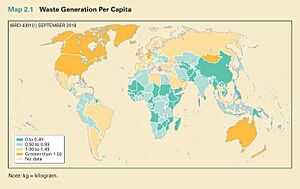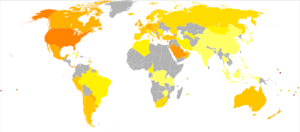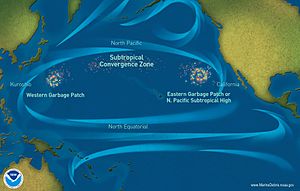Overconsumption (economics) facts for kids
Overconsumption is when people use more goods and services than can be easily replaced or reused. It's like using up your allowance too fast, so you don't have enough for later. When we talk about natural resources, overconsumption means using them so much that it harms the environment. This is also called overexploitation.
Overconsumption isn't just about nature. It can also mean using too many man-made things. Our current global economy often encourages overconsumption. Things like consumerism (always wanting to buy more), planned obsolescence (products designed to break quickly), and wanting lots of material things can drive it. This is the opposite of sustainable consumption, which means using resources wisely for a long time.
It's tricky to say exactly when we're "overconsuming" a natural resource. This is because Earth's ability to provide resources changes. Some areas might have more resources than others. But if a region uses too many resources for a long time, it can lead to environmental degradation, meaning the environment gets damaged.
When we talk about overconsumption and the environment, it often connects to how many people there are and how fast the population is growing. More people wanting better lives means we need to take more resources from the Earth. This can cause problems like climate change and biodiversity loss (losing different kinds of plants and animals).
Today, people in rich, "developed" countries use resources much faster than those in developing countries. Developed nations consume resources at a rate almost 32 times greater than developing nations, even though developing nations have most of the world's people. However, developing countries are also buying more and more. Experts expect that by 2030, countries in Asia, America, and Africa will be responsible for 56% of the growth in consumption. This means consumption patterns will shift. Sustainable Development Goal 12 is an international plan to help manage consumption and production responsibly.
Contents
Causes of Overconsumption
Economic Growth and Resource Use
Sometimes, Economic growth can lead to overconsumption. When a country's economy grows quickly, it often needs more resources to keep that growth going. For example, China's economy grew a lot from 1978. At the same time, its energy use increased six times over! By 1983, China was using more natural resources than its environment could replace. This led to overconsumption. In the last 30–40 years, China has seen a big rise in pollution, land degradation, and the use of non-renewable resources. These changes match its rapid economic growth.
The Worldwatch Institute once said that China, India, and the United States are the three biggest forces shaping Earth's natural systems. A report in 2005 stated that:
The world's ecological capacity is simply not enough to meet the goals of China, India, Japan, Europe, and the United States, plus the hopes of the rest of the world, in a sustainable way.
In 2019, over 11,000 scientists from more than 150 countries signed a warning about the climate crisis. They said that economic growth is the main reason for "too much extraction of materials and overexploitation of ecosystems." They believe this must be stopped quickly to keep our planet healthy for a long time. Also in 2019, a United Nations report found that up to one million plant and animal species are at risk of extinction because of human activity. This report suggested that to have a more sustainable future, global financial systems need to change. They should move away from just focusing on economic growth.
Consumerism and Product Design
Consumerism is a way of life where people are encouraged to buy more and more goods and services. People constantly buy things like food, clothes, housing, energy, technology, and transportation. When we use up the resources needed to make these things too quickly, it's considered overconsumption. Developing countries are becoming bigger consumers, so their buying habits are very important. The World Bank says that people spend the most on food, drinks, clothes, and shoes, no matter how much money they make. In 2015, the top five countries for consumer markets were the United States, Japan, Germany, China, and France.
Planned and perceived obsolescence also contributes to overconsumption. This means products are designed to be thrown away after a short time.
- Perceived obsolescence happens a lot in fashion and technology. Products are made to seem old or out of style quickly, so people want to buy the new version. Think of new phone models or fashion lines that come out frequently.
- Planned obsolescence means products are actually designed to break after a certain amount of time or use.
Wealth and Consumption Patterns
Wealthy people, especially "super-affluent consumers," are often the most responsible for environmental problems due to their buying habits. A 2020 study called "Scientists' warning on affluence" explained that since World War II, our economic systems have led to more wealth, but also to more inequality, financial problems, resource use, and pressure on Earth's systems.
To create a sustainable future, we need to move beyond just focusing on economic growth. We also need to reduce the overconsumption of the very wealthy, not just try to make it "greener." Some ideas to do this include:
- Redistributing wealth through taxes, especially eco-taxes (taxes on things that harm the environment).
- Investing in green technologies.
- Providing a basic income for everyone.
- Reducing work hours.
Other, more radical ideas suggest bigger changes to our economic systems.
Effects of Overconsumption

One major effect of overconsumption is that it reduces the planet's carrying capacity. This means the Earth can support fewer living things. Using too many resources in an unsustainable way will go beyond what the environment can handle (ecological overshoot). This leads to resources running out, environmental degradation, and less healthy ecosystems. A 2020 study by scientists said that overconsumption is the biggest threat to our planet's future. They believe we need big changes in how we live to solve the ecological crisis.
Another study in 2020 warned that if consumption continues at the current rate for the next few decades, it could lead to a full or almost full extinction of humanity. The study noted that while big events like wars are scary, the slow use of planetary resources might not be seen as a danger. To avoid this, humanity needs to shift from an economy-focused society to a "cultural society" that puts the ecosystem's health first.
The huge scale of modern overconsumption can also lead to economic decline and more financial instability. Some people argue that overconsumption helps create an "overclass" of very rich people, while others disagree about its role in class inequality. Population, development, and poverty are all connected to overconsumption in complex ways. This makes it hard to fully understand how consumption affects economic inequality.
In the long run, these effects can cause more conflicts over shrinking resources. In the worst case, it could lead to a Malthusian catastrophe, where population growth outstrips resources. Lester Brown of the Earth Policy Institute said: "It would take 1.5 Earths to sustain our present level of consumption. Environmentally, the world is in an overshoot mode."
As of 2012, the United States alone was using 30% of the world's resources. If everyone consumed at that rate, we would need 3-5 planets to keep up! Resources are quickly running out, with about one-third already gone. With new consumer markets growing in developing countries, which have a much larger percentage of the world's population, this number can only increase. According to the Sierra Club’s Dave Tilford, "With less than 5 percent of world population, the U.S. uses one-third of the world’s paper, a quarter of the world’s oil, 23 percent of the coal, 27 percent of the aluminum, and 19 percent of the copper." The BBC reported that a World Bank study found that "Americans produce 16.5 tonnes of carbon dioxide per person every year. In comparison, only 0.1 tonnes of the greenhouse gas is generated in Ethiopia per person."
A 2021 study suggested that overall consumption will continue to grow, mainly because of increasing wealth and population growth. The authors argued that there's no way to avoid rising human numbers and the resulting overconsumption. However, they did say that the negative impacts could be lessened by policies that support human rights, which might lower birth rates and slow down current consumption patterns.
Effects on Health
A report from the Lancet Commission stated that both undernutrition (not enough food) and obesity (too much food) come from the same unhealthy food systems. These systems focus only on economic growth and ignore negative health outcomes. Climate change has a similar story, driven by profits and power. Obesity was a health problem even in ancient Rome for people who ate too much and didn't move enough. Its impact has grown through history. By 2017, deaths from obesity were three times higher than from hunger, reaching 2.8 million people per year.
Using too much artificial energy, like driving cars instead of walking or cycling, harms both our health and the planet. Promoting active living and reducing a sedentary lifestyle (sitting too much), for example, by cycling, helps reduce greenhouse gas emissions and improves health.
Global Estimates of Impact
In 2010, the International Resource Panel published a global scientific report on the effects of consumption and production. The study found that the most serious impacts are on the health of ecosystems, human health, and resource depletion. From a production point of view, burning fossil fuels, agriculture, and fisheries had the biggest impacts. From a final consumption point of view, household use related to travel, housing, food, and energy-using products caused most of the impacts throughout their life cycle.
According to the IPCC Fifth Assessment Report, human consumption, if current policies continue, will be seven times bigger in the year 2100 than it was in 2010.
Ecological Footprint
The idea of overconsumption is closely linked to the ecological footprint. An "ecological footprint" measures how much human demand there is on Earth's natural systems. For example, China's ecological footprint per person is about half the size of the US. However, China's population is more than four times larger than the US. Experts estimate that if China developed to the same level as the United States, global consumption rates would roughly double.
Humans, and their growing demand for livestock and other domestic animals, have added to overconsumption. This is especially true with environmentally damaging industrial livestock production. Globalization and modernization have brought Western consumer habits, like eating lots of meat, to countries like China and India. These new diets are replacing traditional plant-based diets. Each year, between 166 billion and over 200 billion land and aquatic animals are eaten by the world's population of over 7 billion.
A 2018 study in Science suggested that meat consumption will increase due to human population growth and rising wealth. This will lead to more greenhouse gas emissions and further reduce biodiversity. Another 2018 study in Nature said that meat consumption needs to be reduced by up to 90% to make agriculture sustainable.
A 2022 climate survey found that 56% of people supported a carbon budget system to limit the most climate-damaging consumption. This number was even higher (62%) among those under 30.
Solutions to Overconsumption
The most straightforward solution to overconsumption is to simply slow down how fast we use up resources. From a business point of view, less consumption can seem bad for economies. So, countries need to find ways to reduce consumption rates while also allowing new industries to grow. These new industries could include renewable energy and recycling technologies, which can help ease some of the economic burden. Some movements believe that reducing consumption can actually benefit the economy and society. They think a big change in the global economy might be needed to deal with current and future changes.
Movements and lifestyle choices that aim to stop overconsumption include:
- Anti-consumerism: Opposing the idea of buying more and more.
- Freeganism: Getting food and goods for free, often by salvaging discarded items.
- Green economics: Focusing on an economy that supports environmental health.
- Ecological economics: Studying how economies and ecosystems interact.
- Degrowth: Reducing the size of the economy to reduce resource use.
- Frugality: Being careful with money and resources.
- Downshifting: Choosing a simpler, less stressful life.
- Simple living: Living with fewer possessions and less complexity.
- Minimalism: Living with only what is essential.
- Slow movement: Doing things at a relaxed pace, valuing quality over speed.
- Thrifting: Buying used items.
Many of these movements aim for a steady-state economy. This is an economy where the rate of consumption is just right for human health and the environment.
Recent grassroots movements are finding creative ways to reduce the number of goods we consume. The Freecycle Network is an example. It's a group of people in a community who trade goods or services with each other. It's a new way of thrifting that benefits everyone involved.
Other researchers and movements, like the Zeitgeist Movement, suggest a new economic model. This model would focus on making things more efficient, encouraging collaboration and local production, and promoting effective sharing. It would also emphasize products that are modular (easy to repair), sustainable, and well-designed. All of these ideas are expected to reduce how many resources we use. Solutions also include consumers using their buying power to encourage businesses to make more sustainable products.
Another way to reduce consumption is to slow population growth. This can be done by improving family planning services around the world. In developing countries, over 200 million women do not have enough access to these services. Empowering women in these countries can also lead to smaller families.
See also
- Artificial demand
- Collaborative consumption
- Conspicuous consumption
- Consumption (economics)
- Criticism of capitalism
- Degrowth
- Effects of the car on societies
- Energy crisis
- Environmental studies
- Externality
- The Limits to Growth
- Mottainai
- Overexploitation
- Overshoot (population)
- Peak copper
- Peak oil
- Planet of the Humans (film)
- Preorder economy
- Santosha (renunciation of the need to acquire)
- Steady-state economy
- Surplus: Terrorized into Being Consumers (film)
- World Scientists' Warning to Humanity



